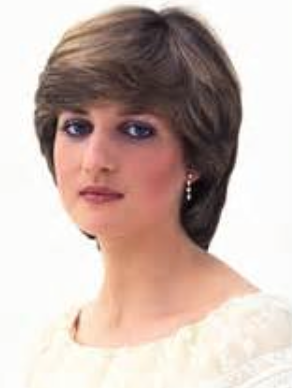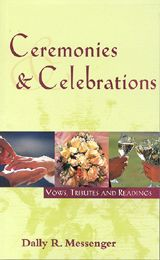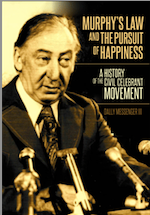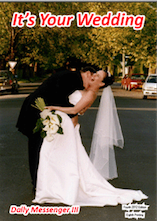Australian Broadcasting Commission Ockham's Razor
Funerals in OZ: Recorded For Robyn Williams April 29, 2005
by Dally Messenger III
Principal, International College of Celebrancy www.celebrancy.com 0411 717 303 dallymessenger@mac.com
Funerals: Pope John Paul II: John F. Kennedy: Princess Diana
In April, the world stopped to watch what came to be billed as the greatest attendance event in history thus far – the funeral of Pope John Paul II. It was a colourful ceremony, for some a serious coming to terms with loss, for others, an entertaining media spectacle. It wasn't a world first. The world had stopped for an event, which is part of the history of everyone in my generation – the Funeral of the assassinated American President, John F. Kennedy.
 Listeners born a little later will remember the funeral of Princess Diana of Great Britain. At the time, Diana's death drew extraordinary manifestations of loss and grief. The Rite of Passage itself drew forth the whole armory of solemn British Pageantry. The English are, in many ways, a staid and inexpressive lot. When it comes to ceremonies, however, no one does it quite like the Brits. Princess Diana's funeral included the best of traditional and contemporary music and song, poetry, and a marvelous eulogy by her brother, which, in its subtlety, was almost a masterpiece of English literature.
Listeners born a little later will remember the funeral of Princess Diana of Great Britain. At the time, Diana's death drew extraordinary manifestations of loss and grief. The Rite of Passage itself drew forth the whole armory of solemn British Pageantry. The English are, in many ways, a staid and inexpressive lot. When it comes to ceremonies, however, no one does it quite like the Brits. Princess Diana's funeral included the best of traditional and contemporary music and song, poetry, and a marvelous eulogy by her brother, which, in its subtlety, was almost a masterpiece of English literature.
Perhaps this illustrates the first point I would like to make about the funeral. It allows people to give expression to thoughts and feelings that they would find culturally impossible to express as individuals, outside the ceremonial context. The very atmosphere of ceremony gives whatever is expressed much more importance, power and meaning.
Mankind is defined by the Funeral
The social anthropologists pinpoint the evolutionary transition from animal to Homo Sapiens i.e. civilised man, when humans first began burying their dead. The funeral ceremony, therefore, is at the primordial heart of human culture. It is this ceremony that is the axis on which, by definition, we differ from the animal. It lifts us to a new level of uniqueness.
It follows that the funeral is an indicator of the level of civilisation we have attained. I consider this was illustrated well in the dawn service at Gallipoli on April 25 last. It was a very moving event – substantial yet simple - very well organised in its quotes, its eulogies, its choreography, its music and its symbolism, such that few could have remained unmoved. The statesmanlike words of Kemal Ataturk, to the mothers of Australia and New Zealand, still ring in my ears: - "Those heroes. . . are now lying in the soil of a friendly country. You . . . mothers wipe away your tears. Your sons are now in our bosom and are at peace." End of quote.
This ceremony cost much more than a million dollars to organise and present. This is justified because, at the public level, funerals loom large in our culture and our consciousness. Many orations on these occasions crystallise the core values of our society. As in all good ceremonies values are expressed, reinforced, and transmitted.
Abraham Lincoln's Gettysburg funeral address, with its immortal lines "government of the people, by the people, for the people" is just one other example. -- So socially we need to grieve in a mutually supportive context. Culturally we need to celebrate our people, and the sentiments and values we believe in. And we do so by drawing on the best artistic resources of our culture – words, movement and music.
At the individual and personal level our need is no less great. Deep in the psyche is the need for human beings to express deep feelings. The psychologists tell us in clear terms, that unless grief is expressed, mental and physical illness follows in its wake. As Tennyson said in his famous poem - Song of the Princess: Home they brought her warrior dead; She nor swoon'd nor utter'd cry. All her maidens, watching, said, She must weep or she will die.
The funeral ceremony is an important structure, that we have evolved to allow us to utter our grief. It follows, and this is another point I wish to make, that the better a funeral is, the more relevant and personal it is, the better it assists us in the grieving process, with better outcomes for our mental health and equanimity.
As one who has officiated at over 1500 personal funerals, I have observed what achieves a level of deep satisfaction. This ensues when a comprehensive chronological biography is the framework, into which a eulogy or eulogies are placed. This chronology is a detailed history of the person and that person's place, however modest, in the broader history of his or her family, community, country and world. This has a deep meaning for those left behind. Details of whom the parents were, what sort of childhood he or she had, where they went to school, what were the circumstances leading up to the marriage with their spouse and so on. It is from history, from genealogy, if you like, that the survivors are reassured of their identity and their connection to the deceased person.
The innate psychology of human beings requires that we ritually move through this painful transition of loss. The psychologists also tell us that to maintain sanity we must face reality – the ritual helps us face this stark and sad event. By so doing we set in motion a healthy grief process and a path back to living normally. The emptiness never goes, but the good funeral ceremony is an important memory, which sustains and consoles us. Well done, it can turn unbearable sadness into a certain coping wisdom within us, and understanding and compassion in dealing with others.
Funeral Celebrants :
Melbourne Australia It is at this point I would like to dwell on what has happened in Australia. Celebrants in Australia have pioneered the best and most meaningful personal funeral ceremonies in the Western world. I proudly claim my place in this unacknowledged movement, which I believe has lifted the level of our cultural life across the board. I have now lectured by invitation in New Zealand, Great Britain, and the USA on Funeral Celebrancy in Australia.
When we first started in 1975 there was nothing for non-church people – and there wasn't very much for church people either. The Catholic Church, for example, only allowed eulogies for priests and bishops. Other denominations and religions were similar. With rare exceptions, there was nothing personal in the funeral ceremony at all.
This pioneer group did not find the market research difficult. The subject of funerals, over any social dinner table, then evoked stories flavoured with dissatisfaction and anger. People complained of lack of personal content, insensitive clergy, names and basic details embarrassingly wrong, all in the rote, same-size-fits-all, funeral service. The 1975 group decided on a painstakingly prepared eulogy and ceremony. Once written, the eulogy and ceremony was to be carefully verified, and every detail checked with the family. The delivery of the funeral itself was to be done with sincerity, care and attention.
Funeral Directors are the "gatekeepers":
Should they be? But practical difficulties emerged which we have never satisfactorily solved. Funeral Directors are the "gatekeepers" and, with some notable exceptions, do not appreciate the need for well-prepared and checked ceremonies, for which the celebrant is properly paid. I have seen many wonderful funeral celebrants, full of enthusiasm, burn out because of too much work for too little money. I have seen others forced to lower their standards of preparation in the cause of financial survival.
Gatekeeper Funeral Directors often push clients onto clergy because they erroneously believe that unless they get a cheap ceremony, they will get less of the limited money pie. I believe that this is a mistake but it is what happens.
So I have some clear advice. In the unfortunate event of a death, or an impending death, in your family, ring your celebrant first. Ask your celebrant to contact a cooperative Funeral Director and arrange the ceremony you want. This keeps this important event under your control.
Otherwise chances are you will be pushed onto a cheap celebrant, or an even less willing clergyperson – as we saw so recently in the news. The clergyman you recall, understandably did not want John Lennon's "Imagine", the words of which reject the after-life, sung or played in his church.
I have two other strong pieces of advice for you. The first is – insist on paying your Funeral Celebrant an hourly rate. It takes at least 15-20 hours to prepare a thorough, indeed rewarding, Funeral ceremony. A fixed fee confines the celebrant to operating within narrow economic parameters. From the celebrant point of view, he or she should be financially enabled to do what she ought to do, that is, drop everything and give your family, and the task in hand, every attention until completion.
Finally, do not give way to the temptation to have the ceremony scheduled too quickly. I have seen it so often – a funeral scheduled too soon ‑ over in a couple of days. This never works satisfactorily. The celebrant, for a start, has no chance to prepare properly. Often friends and family become greatly frustrated because they hear about the death and funeral after it is over. People need time for the word to get around, and often to organise time off work. I believe five working days is reasonable in the Australian context.
What really matters to you, dear listener, is what words are said, what music is played and what symbols represent and honour the person you loved. It is not just what is done, of course, it is how it is done, and how it all comes together. This is the task of the professional celebrant. It is a big responsibility. And let me say this clearly – There is no short cut to a good ceremony.
The Funeral is a significant Rite of Passage, which sooner or later will touch almost everyone. Most people I know want to be farewelled with dignity and respect. Socially, culturally and personally the Funeral Rite contributes significantly to the richness of our social fabric.
© D. Messenger 2005 -2014
Ceremonies - all |
History |
Marriage Ceremonies |
---=

